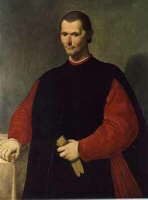Philosophy Pages
| Dictionary | Study Guide | Logic | F A Q s | ||
|---|---|---|---|---|---|---|
| History | Timeline | Philosophers | Locke | |||
Philosophy Pages
| Dictionary | Study Guide | Logic | F A Q s | ||
|---|---|---|---|---|---|---|
| History | Timeline | Philosophers | Locke | |||

|
Life and Works . . The Prince . . Leadership Bibliography Internet Sources |
In 1498, Niccolò Machiavelli began his career as an active politician in the independent city-state of Florence, engaging in diplomatic missions through France and Germany as well as Italy. After more than a decade of public service, he was driven from his post when the republic collapsed. Repeated efforts to win the confidence and approval of the new regime were unsuccessful, and Machiavelli was forced into retirement and a life of detached scholarship about the political process instead of direct participation in it. The books for which he is remembered were published only after his death.
Machiavelli originally wrote
Principe
 (The Prince) (1513) in hopes of securing the favor of the ruling Medici family, and he deliberately made its claims provocative.
The Prince is an intensely practical guide to the exercise of raw political power over a Renaissance principality. Allowing for the unpredictable influence of fortune, Machiavelli argued that it is primarily
the character or vitality or skill of the individual leader that determines the success of any state. The book surveys various bold means of
acquiring and maintaining the principality and evaluates each of them solely by reference to its likelihood of augmenting the glory of the prince while serving the public interest. It is this focus on practical success by any means, even at the expense of traditional moral values, that earned Machiavelli's scheme a reputation for ruthlessness, deception, and cruelty.
(The Prince) (1513) in hopes of securing the favor of the ruling Medici family, and he deliberately made its claims provocative.
The Prince is an intensely practical guide to the exercise of raw political power over a Renaissance principality. Allowing for the unpredictable influence of fortune, Machiavelli argued that it is primarily
the character or vitality or skill of the individual leader that determines the success of any state. The book surveys various bold means of
acquiring and maintaining the principality and evaluates each of them solely by reference to its likelihood of augmenting the glory of the prince while serving the public interest. It is this focus on practical success by any means, even at the expense of traditional moral values, that earned Machiavelli's scheme a reputation for ruthlessness, deception, and cruelty.
His Dell'arte della guerra (The Art of War) (1520)
 explains in detail effective procedures for the acquisition, maintenance, and use of a military force. Even in his more leisurely reflections on the political process, Machiavelli often wrote in a similar vein. The Discorsi sopra la prima Deca di Tito Livio
(Discourses on Livy) (1531) review the history of the Roman republic, with greater emphasis on the role of fortune and a clear
admiration for republican government.
Here, too, however, Machiavelli's conception of the proper application of morality to practical political life is one that judges the skill of all participants in terms of the efficacy with which they achieve noble ends. Whatever the form of government, Machiavelli held, only success and glory really matter.
explains in detail effective procedures for the acquisition, maintenance, and use of a military force. Even in his more leisurely reflections on the political process, Machiavelli often wrote in a similar vein. The Discorsi sopra la prima Deca di Tito Livio
(Discourses on Livy) (1531) review the history of the Roman republic, with greater emphasis on the role of fortune and a clear
admiration for republican government.
Here, too, however, Machiavelli's conception of the proper application of morality to practical political life is one that judges the skill of all participants in terms of the efficacy with which they achieve noble ends. Whatever the form of government, Machiavelli held, only success and glory really matter.
|
Recommended Reading:
Primary sources:
Secondary sources:
Additional on-line information about Machiavelli includes:
|
